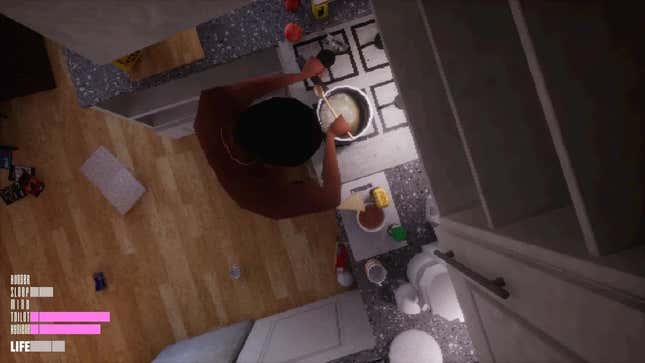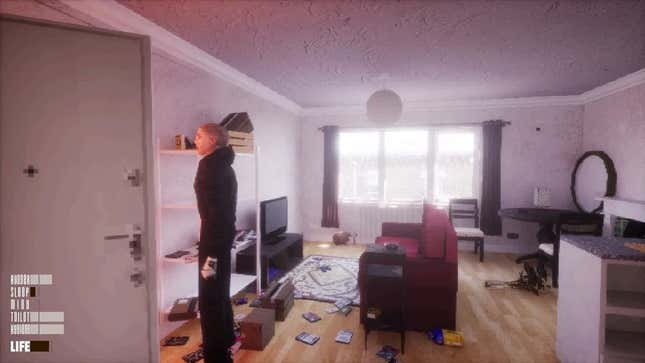One of the most well-known principles of theatrical storytelling is widely referred to as “Chekhov’s gun.” The principle suggests that if some element is introduced to a story, even in a casual, offhand way, by the end, it had better prove significant. Or, as it’s often summed up, if a gun shows up at some point in your story, by the end, it had better go off. So, when a gun shows up early in my playthrough of narrative game Apartment Story, you can imagine where my mind immediately went.
April’s Air Combos Make Her TMNT: Shredder’s Revenge’s Raddest Playable Character
The game, from developer Blue Rider Interactive, is clearly working within that basic narrative concept but its connections to theater and the medium’s style of storytelling go even deeper. What that results in is a brisk esoteric narrative blending Chekhov with The Sims in fascinating ways that don’t always work, but are utterly unique in execution.
Before the gun shows up in Apartment Story, you might find the gameplay loop pretty mundane, even boring. It’s a life simulator in which you control Arthur, an out-of-a-job writer cooped up in his apartment doing nothing of importance. You’ll take a shower, eat some food, have a cigarette, type away at your computer, jerk off, drink beer, watch a movie, or any number of basic things. What makes these activities all the more interesting, however, is how much effort each of them take.

If you want to make a basic meal you need to manually open the fridge, individually pick up each ingredient and drop it on a cooking board, activate the stovetop to actually cook, wait 15 in-game minutes, grab a plate to serve the food on, then sit down at a table to eat. It’s a lengthy process and on paper it’s pretty uninteresting, but the mundane loop still manages to scratch that itch in your brain that makes you want to do it again and again. To encourage you to actually engage with the loop, Arthur has a list of needs that must be managed, like hunger. If any of these stats gets too low you’ll start moving slower.
Arthur’s normal life begins to get strange when his old roommate Dianne shows up asking to grab something from one of his rooms. That mysterious thing is, shocker, the gun. It’s been hidden in the bedroom of your absent current roommate Godot (more theater references for you). Dianne tells you a story about how she is running from her abusive lover and is ready to protect herself in any way. Over the next couple of in-game days, during which you still have to manage all your stats, Dianne’s entrance back into your life turns it into a thriller in which your safety is not guaranteed. That is first illustrated when you awake one morning to discover everything in your apartment has been thrown across the floor and a man named Blondie—who identifies himself as Dianne’s lover—is sitting at your dining table. He tells you to stay away from Dianne and then beats the shit out of you.
While Blondie’s appearance should have made me worry for Dianne and Arthur’s lives, the first thing I felt was rage at the state of the apartment. This asshole threw all of my shit across the apartment and now I have to clean it. I had to pick up each book, DVD, plant, and fork one-by-one and organize them in some way that made the apartment feel clean again. It’s an excellent way to make me more invested in the outcome of the story, because after that, I kind of wanted to kill that guy too!

The use of Chekhov’s gun in Apartment Story keeps you on your toes, which is what the device has always been intended to accomplish. Once the gun is in the picture you’re more on edge, more attentive to everything Arthur, Dianne, and Blondie do and say. But what’s even more interesting is how Apartment Story adds a twist to the narrative device that only games can—while tradition says that the gun must go off, Apartment Story leaves that decision up to you. No gun actually has to be fired, though there will be consequences to pulling the trigger or not. There is also plenty of narrative downtime, during which you’ll have to occupy several in-game hours of Arthur’s life with mundane tasks while you wait for something to happen, which breaks up the dramatic highs in an absurdly hilarious way thanks to the ridiculous life-sim elements.
From start to finish, Apartment Story will take you about two hours to complete. The writing is strongest in the early sections of the game, as it feels more grounded in the mundanity of Arthur’s depressing life. As the game goes on, and the stakes get higher, the story devolves into melodrama with some predictable beats. But the blending of life sim elements with a high stakes narrative that takes place in a relatively short period of time—both in-game and in reality—makes for a compelling game that has you steadily more invested as it goes on.
.
You Might Also Like
X2 Superstrike Shaves A Blink Of An Eye Off Your Gaming Delay
Usually, pro esports players are hesitant to change up their peripherals, especially before a big tournament. Getting comfortable with a...
Metal Gear’s Snake Voiced By David Hayter In Rainbow Six Reveal
Metal Gear Solid‘s bandana-furrowing Snake is teaming up with Splinter Cell‘s Sam Fisher and the rest of Rainbow Six Siege‘s...
11 Tips For New And Returning Overwatch Players
Some of us never stopped playing Overwatch, but many players have come and gone as the hero shooter has had...
The Winner Of The 2026 Winter Olympics Is Drone Cameras
This year’s Winter Olympics have been some of the coolest to watch, thanks to some talented drone operators providing viewers...










